Saturday, September 16, 2006
Do as we say, don't do as we do
With Chavez holding a 40 point lead in the campaign for President it almost isn't worth blogging about. But from time to time something interesting comes up.
The opposition has constantly complained about Chavez using his offices and the government to help his campaign. Some of those complaints are definitely valid. Certainly plastering "With Chavez we all govern" on all government advertisements is hardly fair or proper. So the opposition does have a legitimate issue with this.
However, leave it to those bone heads to promptly go out and do even WORSE.
For example Manuel Rosales, who is the main opponent of Chavez and also the governor of the state of Zulia has recently use official Zulia advertisements to promote his campaign as can be seen here:

This ad calls on people to "be bold" with Rosales yet it clearly has the offical label of the State of Zulia on the bottom as this blowup shows:

This would seem to clearly indicate that Zulia government funds are being used for outright campaign ads. Even the Chavistas haven't done that yet!!!
But it gets worse. The Venezuelan electoral authorities have banned subliminal advertising. Yet the Rosales campaign has just be caught using them. In advertising that was ostensibly for the State of Zulia his campaign slogan "Atrevete" was shown for a fraction of a second. This had was shown repeatedly for weeks before being pulled. One can see a bit of it here.
Once the Rosales campaign was caught they, as the opposition always does, refused to take the blame and said it was the mistake of their publicity firm!! Apparently it was all a mistake in the editing of the commercial. Yeah, right we beleive that!!
So when it comes to the opposition you aren't supposed to cheat because they will promptly denounce that. But if they turn around and cheat too, well that is A-ok. They just never change.
BTW, here is the text of the Ultimas Noticias article where it was attributed to the advertising firm, just for documentation purposes:
EXPLICACIÓN PRODUCTORA DEL COMERCIAL DICEN QUE NO HUBO MALA INTENCIÓN
Propaganda subliminal fue un error de edición
Pelón al rehacer un video original dejó la frase que se quería quitar
ALEJANDRO BOTÍA
Caracas. A un error de edición atribuyó el presidente de la firma de publicidad AIP, Carlos Rodríguez, la inserción de la palabra "atrévete", en el comercial promocional de la gobernación de Zulia, que el Comando Miranda calificó como propaganda subliminal.
La pieza, que desató un escándalo político por la presunta utilización de técnicas ilegales de sugestión inconsciente, se originó tras la rematrización de un comercial previo elaborado a finales de julio para la entidad occidental, el cual intercalaba cinco veces la frase "atrévete" durante sus 30 segundos de duración.
Después que el CNE aprobó las normas de publicidad y propaganda para la campaña (que impiden usar eslóganes de los candidatos en los comerciales de instituciones públicas), la gobernación zuliana solicitó a AIP modificar el video original y sustituir la palabra "atrévete" por la frase "el camino", explica Rodríguez.
La productora insertó el nuevo mensaje sobre el espacio ocupado por los anteriores, aplicando una técnica conocida en el argot publicitario como "wipe" o barrido, que consiste en difuminar la imagen mediante el desvanecimiento progresivo de sus elementos.
En una de las cinco inserciones de "el camino", la duración del barrido fue ligeramente inferior al tiempo de exposición de la frase original. De este modo explica Rodríguez que alcanza a percibirse durante 1,5 décimas de segundo la palabra "atrévete" en la nueva versión del comercial.
Ricardo Sucre, miembro del equipo creativo del comercial, asegura que no existió ninguna intención velada y que de ser así, se habría intercalado la frase en los cinco segmentos y no sólo en uno. También desmiente que pueda atribuirse a la mera palabra "atrévete" la generación de conductas inconscientes. La pieza se transmitió 4 veces al día en tres canales por tres semanas.
|
The opposition has constantly complained about Chavez using his offices and the government to help his campaign. Some of those complaints are definitely valid. Certainly plastering "With Chavez we all govern" on all government advertisements is hardly fair or proper. So the opposition does have a legitimate issue with this.
However, leave it to those bone heads to promptly go out and do even WORSE.
For example Manuel Rosales, who is the main opponent of Chavez and also the governor of the state of Zulia has recently use official Zulia advertisements to promote his campaign as can be seen here:

This ad calls on people to "be bold" with Rosales yet it clearly has the offical label of the State of Zulia on the bottom as this blowup shows:

This would seem to clearly indicate that Zulia government funds are being used for outright campaign ads. Even the Chavistas haven't done that yet!!!
But it gets worse. The Venezuelan electoral authorities have banned subliminal advertising. Yet the Rosales campaign has just be caught using them. In advertising that was ostensibly for the State of Zulia his campaign slogan "Atrevete" was shown for a fraction of a second. This had was shown repeatedly for weeks before being pulled. One can see a bit of it here.
Once the Rosales campaign was caught they, as the opposition always does, refused to take the blame and said it was the mistake of their publicity firm!! Apparently it was all a mistake in the editing of the commercial. Yeah, right we beleive that!!
So when it comes to the opposition you aren't supposed to cheat because they will promptly denounce that. But if they turn around and cheat too, well that is A-ok. They just never change.
BTW, here is the text of the Ultimas Noticias article where it was attributed to the advertising firm, just for documentation purposes:
EXPLICACIÓN PRODUCTORA DEL COMERCIAL DICEN QUE NO HUBO MALA INTENCIÓN
Propaganda subliminal fue un error de edición
Pelón al rehacer un video original dejó la frase que se quería quitar
ALEJANDRO BOTÍA
Caracas. A un error de edición atribuyó el presidente de la firma de publicidad AIP, Carlos Rodríguez, la inserción de la palabra "atrévete", en el comercial promocional de la gobernación de Zulia, que el Comando Miranda calificó como propaganda subliminal.
La pieza, que desató un escándalo político por la presunta utilización de técnicas ilegales de sugestión inconsciente, se originó tras la rematrización de un comercial previo elaborado a finales de julio para la entidad occidental, el cual intercalaba cinco veces la frase "atrévete" durante sus 30 segundos de duración.
Después que el CNE aprobó las normas de publicidad y propaganda para la campaña (que impiden usar eslóganes de los candidatos en los comerciales de instituciones públicas), la gobernación zuliana solicitó a AIP modificar el video original y sustituir la palabra "atrévete" por la frase "el camino", explica Rodríguez.
La productora insertó el nuevo mensaje sobre el espacio ocupado por los anteriores, aplicando una técnica conocida en el argot publicitario como "wipe" o barrido, que consiste en difuminar la imagen mediante el desvanecimiento progresivo de sus elementos.
En una de las cinco inserciones de "el camino", la duración del barrido fue ligeramente inferior al tiempo de exposición de la frase original. De este modo explica Rodríguez que alcanza a percibirse durante 1,5 décimas de segundo la palabra "atrévete" en la nueva versión del comercial.
Ricardo Sucre, miembro del equipo creativo del comercial, asegura que no existió ninguna intención velada y que de ser así, se habría intercalado la frase en los cinco segmentos y no sólo en uno. También desmiente que pueda atribuirse a la mera palabra "atrévete" la generación de conductas inconscientes. La pieza se transmitió 4 veces al día en tres canales por tres semanas.
|
Friday, September 15, 2006
It's a office complex, it's a mall, no it's...
Seeing as the CNE was nice enough not to ban the images of the absolutely huge amount of construction going in Venezuela I guess now would be a good time to start showing some of them - after all showing any decent portion of them is sure to be time, and bandwidth intensive so I better get started.
See if you can figure out what this first project is before scrolling to the bottom:
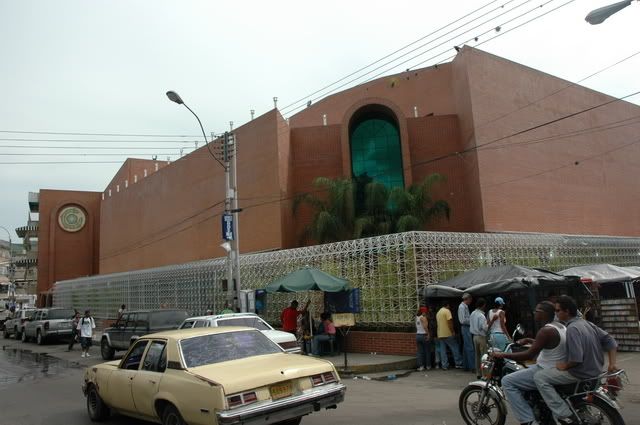
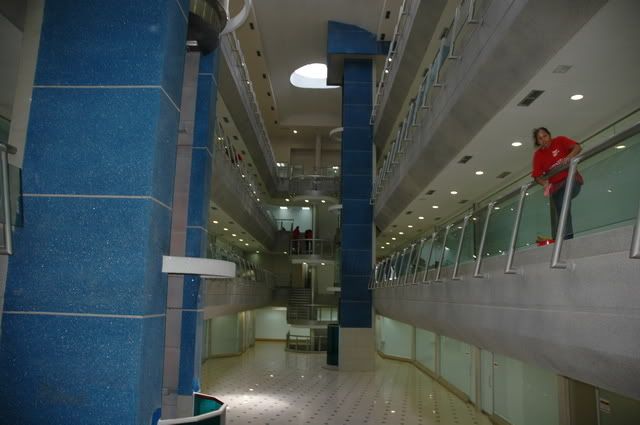
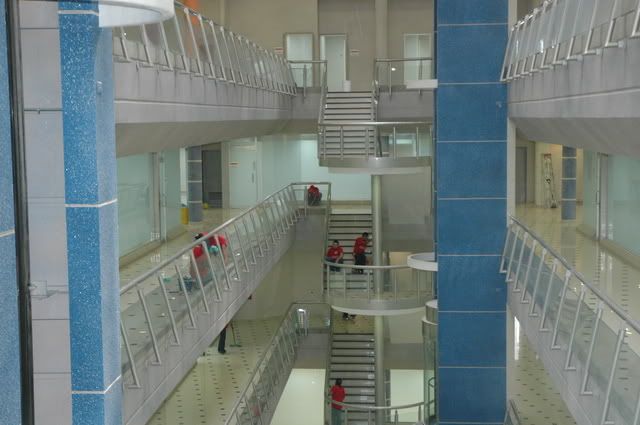
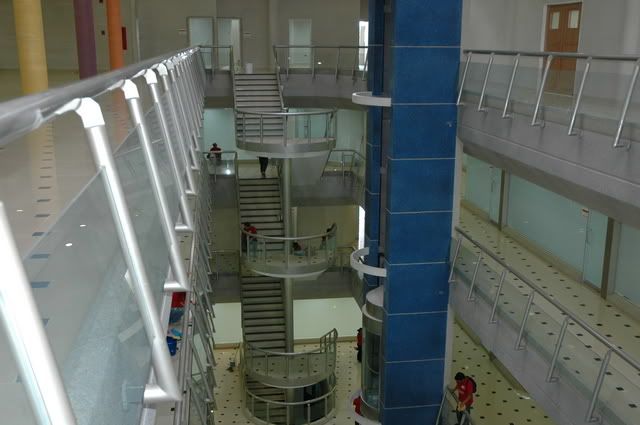
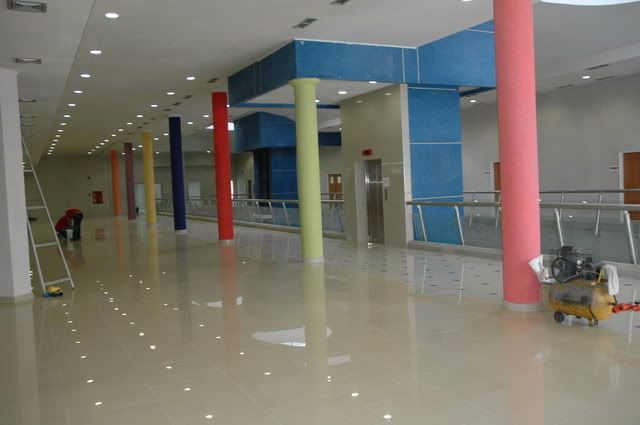
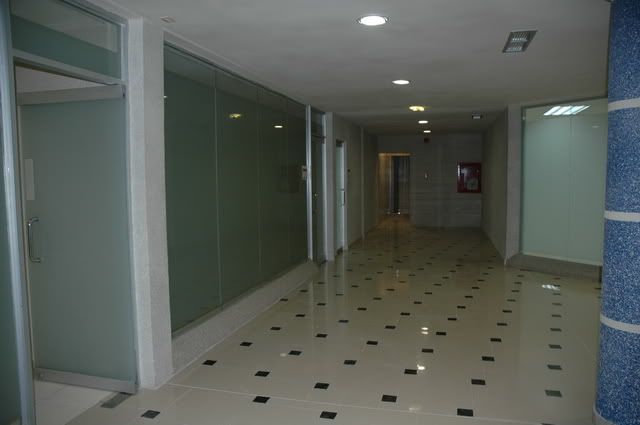
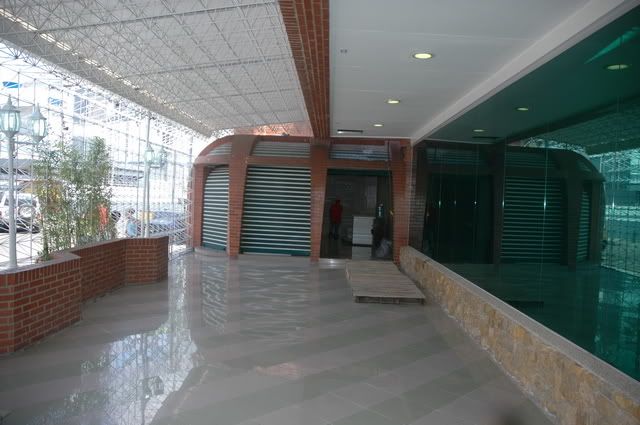
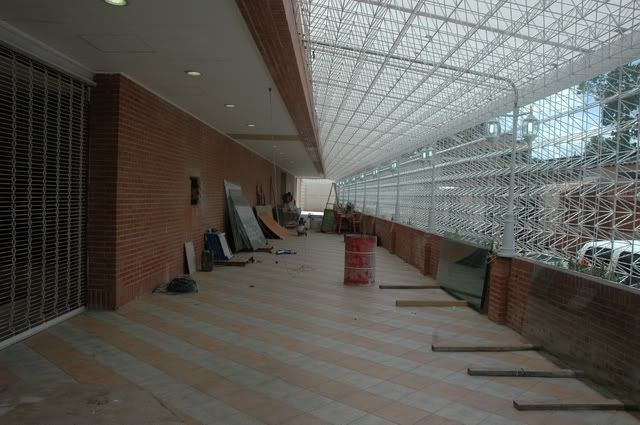
Actually, it was pretty easy to guess what it is. Reflective glass, gleaming floors, a nice atrium... obviously it's a shopping mall. In fact it's a new shopping mall being built in Caracas to compete with the already jam packed malls like the Sambil, the San Ignacio, etc. Retail sales are up so much that these spiffy new malls are just popping up like...
Ok, ok, I'm busted. I'll admit it - it isn't really a shopping mall at all. What it is a new building for the Bolivarian University (the new university system created by Chavez to educate those historically excluded from higher education in Venezuela)in Los Valles del Tuy, a sattellite city of Caracas. When it is inaugurated later this month it will house thousands of students and also house various of the governments social programs called Missions.
Yes, it may be hard to believe, but this VERY nice building, which really could pass for a luxury shopping mall, is being built by the government to provide services to lower income Venezuelans. This illustrates a key point that can't be lost on anyone who sees first hand the public works projects being built by the Venezuelan government. Chavez's government doesn't build cheap junk like previous governments did. When it builds things it makes sure they are durable structures meant to provide first rate services in a dignified atmosphere. We saw it last year with the VERY nice public housing, we see it now with this and we will be seeing it more and more as I post on Venezuela's public works projects.
|
See if you can figure out what this first project is before scrolling to the bottom:








Actually, it was pretty easy to guess what it is. Reflective glass, gleaming floors, a nice atrium... obviously it's a shopping mall. In fact it's a new shopping mall being built in Caracas to compete with the already jam packed malls like the Sambil, the San Ignacio, etc. Retail sales are up so much that these spiffy new malls are just popping up like...
Ok, ok, I'm busted. I'll admit it - it isn't really a shopping mall at all. What it is a new building for the Bolivarian University (the new university system created by Chavez to educate those historically excluded from higher education in Venezuela)in Los Valles del Tuy, a sattellite city of Caracas. When it is inaugurated later this month it will house thousands of students and also house various of the governments social programs called Missions.
Yes, it may be hard to believe, but this VERY nice building, which really could pass for a luxury shopping mall, is being built by the government to provide services to lower income Venezuelans. This illustrates a key point that can't be lost on anyone who sees first hand the public works projects being built by the Venezuelan government. Chavez's government doesn't build cheap junk like previous governments did. When it builds things it makes sure they are durable structures meant to provide first rate services in a dignified atmosphere. We saw it last year with the VERY nice public housing, we see it now with this and we will be seeing it more and more as I post on Venezuela's public works projects.
|
Thursday, September 14, 2006
Worse, and worse, and worse... and where it all ends is anyone'g guess
Sometimes I feel like I should take Iraq out of the description of this blog given that I discuss it so little. With so many other sites that cover it so well and with what is at this point the monotony of an ongoing meat grinder why bother? Especially when there are so many GOOD things happening in Venezuela. Blogging goods news is a lot more fun than blogging death and mayhem and just plain bad news as is the case with Iraq.
However, yesterday there appeared an article in the Wall Street Journal that needs to be brought up because it clearly showed the wars in Iraq and Afghanistan are going worse than the U.S. government and media have let on. In fact, it seems the U.S. will face a decision within the next year, or two at most, to either retreat in defeat or significantly expand the wars.
First some exerps from the article:
So lets see what we can glean here: In Iraq rather than troop draw-downs the troop level there is the highest it has been since the invasion (talk about keeping things hush hush you sure don’t hear about that on the evening news). Yet even with these ever higher troop levels Iraq is having both an insurgency and a civil war at the same time and they can’t even control the capital city.
In Afghanistan the U.S. tried a totally different approach from Iraq. Rather than trying to control the whole country, like the Soviets tried to do, they settled for only controlling major population centers and letting the rest of the country suffer “benign neglect” for lack of a better term. For a while it seemed as though that was an effective strategy. Now that it has blown up in their face it’s a policy only a heroin addict could love.
Worse still, the U.S. leadership seems to have no clue. So much so that it takes a whacky business pundit to state the obvious – that in an insurgency time doesn’t favor the occupier, it favors the insurgents. If the Iraqi insurgents can keep this level of violence up for a number of years more they win, guaranteed. It’s not just that the U.S. isn’t winning, it’s actually losing. Yes, it may be a military stalemate with neither side able to impose its will militarily on the other but in such situations, as even Lou Dobbs can see, the insurgents are clearly winning.
Where does this leave everything? In a very bad way I’m afraid. I’m not big on offering predictions as I don’t have a crystal ball anymore than anyone else does. But I will venture this guess. The U.S. ruling class is not willing to admit defeat. The American public may have turned against this war but I think the U.S. rulers still view this as a must win war. And I don’t mean just Bush and Cheney. If John Kerry were President I’m quite sure he would be equally committed to the U.S. continuing to prosecute this war. I think it is universally accepted by the powers that be that to lose this war would be an unacceptably large blow to their power, their standing in the world, and their interests in the Middle East.
For that reason I think they will yet do more to escalate the war in hopes of winning it militarily. That manifests itself already on the rhetorical level. Witness Bush’s recent use of the term “Islamofascist” which had previously been used only by fringe elements. Witness his whole foreign policy team saying that either we “fight them there, or fight them here”. Their propaganda about WMD and democratizing the Middle East may have gone out the window but they remain undaunted. Hence the new and even more extreme rhetoric.
That intensified rhetoric may well soon move to intensified actions. One scenario that I think is quite possible is the following: Once the upcoming congressional elections pass Bush will enter the lame duck phase of his Presidency. Historically a lot of unpopular policies have been implemented by lame duck presidents to relieve a new incoming of President of having to expend political capital on them. For that reason I think there is a very good chance that starting in 2007 the U.S. will start increasing its military forces in the Iraq and Afghanistan significantly. One way they can do this is just to stop this rotation non-sense and leave military units in Iraq for multiple years – say keeping units there two years at a time as opposed to one. In that way they could get well over 200,000 troops in Iraq which is probably what they are going to have to do.
This is all speculative on my part of course. But I do think it is more likely than not to happen. Mainly because with things clearly deteriorating rapidly the only alternative is to pull out. They really are in a “fish or cut bait” situation and I just don’t seem them cutting bait yet.
So like Credence Clearwater Revival I see “A bad moon rising”
|
However, yesterday there appeared an article in the Wall Street Journal that needs to be brought up because it clearly showed the wars in Iraq and Afghanistan are going worse than the U.S. government and media have let on. In fact, it seems the U.S. will face a decision within the next year, or two at most, to either retreat in defeat or significantly expand the wars.
First some exerps from the article:
Mideast Peril Growing Concern: Terrorist Havens In 'Failed States'.
Instability in Afghanistan, Iraq, Lebanon Raise Risk That U.S. Seeks to
Address
A Province's 'Execution Unit'
By YOCHI J. DREAZEN and PHILIP SHISHKIN
In April, Saudi Arabia disclosed plans for an unusual and hugely
expensive project: a multibillion-dollar electrified fence along its
560-mile border with Iraq.
The move angered U.S. and Iraqi officials, but Saudi officials said
Iraq's growing instability left them little choice. They said they were
concerned about militants infiltrating from Iraq to carry out attacks
aimed at either toppling the ruling family or inciting Saudi Arabia's
restive Shiite minority to seek independence.
Concern about extremism seeping out of Iraq underscores a painful irony
in the five-year-old war against terrorism: The U.S. and its allies now
face the distinct possibility that the same kind of "failed state" that
gave terrorists a haven when the Taliban ruled Afghanistan -- leading
to Sept. 11 -- could be forming again, in more than one place.
Both Iraq and Lebanon are threatening to degenerate into states with
weak central governments where extremists can thrive. Iraq already
appears to serve as a kind of finishing school for young radicals
seeking battlefield experience. In Lebanon, Hezbollah's war with Israel
this summer both destabilized the country and enhanced the reputation
of Hezbollah extremists, who in the past have demonstrated a desire to
extend their reach beyond Lebanon's borders.
To make matters worse, Afghanistan itself now appears to be sliding
backward so much that it could again become an international terror
breeding ground.
Forces from the U.S. and the North Atlantic Treaty Organization are
locked in the bloodiest fighting in Afghanistan since late 2001. U.S.
casualties are running at more than twice last year's rate. U.S.
military commanders speak openly of an "Iraq-ification" of Afghanistan:
Once-rare suicide bombings and roadside bombs have become common, and
both arms and militants flow over mostly undefended borders. Much as in
Iraq, the bulk of the Afghan insurgency is local, but there are signs
al Qaeda-linked foreign fighters are participating.
…………………………………….
This unwelcome picture is forcing changes in America's posture across
the region. Most significantly, the U.S. in midsummer abandoned a plan
that Gen. George Casey, the top American commander in Iraq, had crafted
that would have had the U.S. withdrawing some of its forces beginning
this month.
Instead, the number of American forces in Iraq is increasing. In recent
weeks the U.S. has shifted thousands of troops to Baghdad as part of an
effort to secure the city, which means the U.S. has had to increase the
overall number of troops in Iraq. Last week, the Pentagon said there
were 145,000 troops, or 18,000 more than in late July and the highest
level since the start of the year.
Senior military leaders say their top priority is to ensure that Iraq
doesn't become a failed state. That has caused shifts in how U.S.
forces operate on the ground. In places such as Tal Afar in northern
Iraq and Tarmiyah, a Sunni stronghold northeast of Baghdad, U.S.
military forces are reaching out to insurgent leaders in search of some
sort of compromise that would get them to participate in the political
process and move away from terror groups. As a result, American
officers today are negotiating with Sunni leaders who only a couple of
years earlier had been in jail.
………………………………..
Meanwhile, amid mounting concerns that Lebanon and Iraq are becoming
terrorist havens akin to Afghanistan under the Taliban, Afghanistan
itself appears to sliding back toward disarray.
U.S. and NATO commanders cite three big problems there. The Hamid
Karzai government is deeply unpopular in many rural areas, seen as a
U.S. puppet. Opium-poppy production is skyrocketing, with Afghanistan
now supplying 92% of the world's supply of the heroin ingredient,
according to the U.N. Office on Drugs and Crime. The biggest threat is
a military one: A resurgent Taliban has triggered the heaviest fighting
since the U.S. toppled the fundamentalist Islamic group's rule in 2001.
Taliban offensives have left more than 1,000 people dead in the past
four months and greatly complicated reconstruction efforts. In just the
past few days, a suicide bomber killed a provincial governor, and then
another suicide bomber attacked at his funeral.
NATO commanders in southern Afghanistan have been surprised by both the
intensity of the Taliban attacks and the tactics used. They say the
Taliban have shifted from ambushes to larger-scale ground assaults, in
which the militants stand and fight rather than melt back into the
countryside. On Thursday, NATO's top commander, Gen. James Jones, asked
the alliance's 26 member states to send more soldiers, warplanes and
helicopters to reinforce the allied forces battling the Taliban
So lets see what we can glean here: In Iraq rather than troop draw-downs the troop level there is the highest it has been since the invasion (talk about keeping things hush hush you sure don’t hear about that on the evening news). Yet even with these ever higher troop levels Iraq is having both an insurgency and a civil war at the same time and they can’t even control the capital city.
In Afghanistan the U.S. tried a totally different approach from Iraq. Rather than trying to control the whole country, like the Soviets tried to do, they settled for only controlling major population centers and letting the rest of the country suffer “benign neglect” for lack of a better term. For a while it seemed as though that was an effective strategy. Now that it has blown up in their face it’s a policy only a heroin addict could love.
Worse still, the U.S. leadership seems to have no clue. So much so that it takes a whacky business pundit to state the obvious – that in an insurgency time doesn’t favor the occupier, it favors the insurgents. If the Iraqi insurgents can keep this level of violence up for a number of years more they win, guaranteed. It’s not just that the U.S. isn’t winning, it’s actually losing. Yes, it may be a military stalemate with neither side able to impose its will militarily on the other but in such situations, as even Lou Dobbs can see, the insurgents are clearly winning.
Where does this leave everything? In a very bad way I’m afraid. I’m not big on offering predictions as I don’t have a crystal ball anymore than anyone else does. But I will venture this guess. The U.S. ruling class is not willing to admit defeat. The American public may have turned against this war but I think the U.S. rulers still view this as a must win war. And I don’t mean just Bush and Cheney. If John Kerry were President I’m quite sure he would be equally committed to the U.S. continuing to prosecute this war. I think it is universally accepted by the powers that be that to lose this war would be an unacceptably large blow to their power, their standing in the world, and their interests in the Middle East.
For that reason I think they will yet do more to escalate the war in hopes of winning it militarily. That manifests itself already on the rhetorical level. Witness Bush’s recent use of the term “Islamofascist” which had previously been used only by fringe elements. Witness his whole foreign policy team saying that either we “fight them there, or fight them here”. Their propaganda about WMD and democratizing the Middle East may have gone out the window but they remain undaunted. Hence the new and even more extreme rhetoric.
That intensified rhetoric may well soon move to intensified actions. One scenario that I think is quite possible is the following: Once the upcoming congressional elections pass Bush will enter the lame duck phase of his Presidency. Historically a lot of unpopular policies have been implemented by lame duck presidents to relieve a new incoming of President of having to expend political capital on them. For that reason I think there is a very good chance that starting in 2007 the U.S. will start increasing its military forces in the Iraq and Afghanistan significantly. One way they can do this is just to stop this rotation non-sense and leave military units in Iraq for multiple years – say keeping units there two years at a time as opposed to one. In that way they could get well over 200,000 troops in Iraq which is probably what they are going to have to do.
This is all speculative on my part of course. But I do think it is more likely than not to happen. Mainly because with things clearly deteriorating rapidly the only alternative is to pull out. They really are in a “fish or cut bait” situation and I just don’t seem them cutting bait yet.
So like Credence Clearwater Revival I see “A bad moon rising”
|
A boom even the opposition can see
A week ago there was an economic perspectives meetings at the Venezuelan-American Chamber of Commerce. It was there that Datanalisis presented its numbers showing how the real income of the majority of Venezuelans has climbed dramatically under Chavez.
But there were other ones such as a presentation on the general state of the economy by MetroEconomica
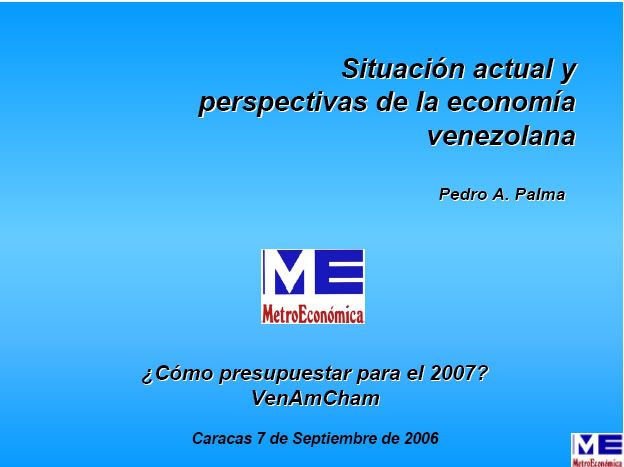
This slide which shows the REAL (ie adjusted for inflation) price of oil is quite interesting:
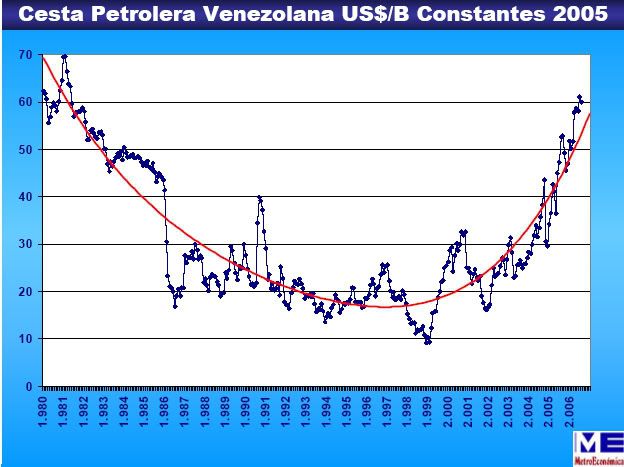
Note how in the decades preceding Chavez coming to office the price of oil was on a steady downward slope. Of course, it wasn't only the actions of Veneuela that were responsible for that but they played a big part. Their rampant over production and quota busting had a devastating effect on prices and despite the curve that seems to bottom out in the late 90s note that the actual price of oil headed to new lows in 1998. It was only when Chavez came to office in 1999 that it began to climb - who knows where it would have ended up if the opposition was still running the country and maximizing production. Chavez is certainly not responsible for oil's recent dizzying climb but he is responsible for getting the ball rolling in the right direction and Venezuela is reaping huge dividends.
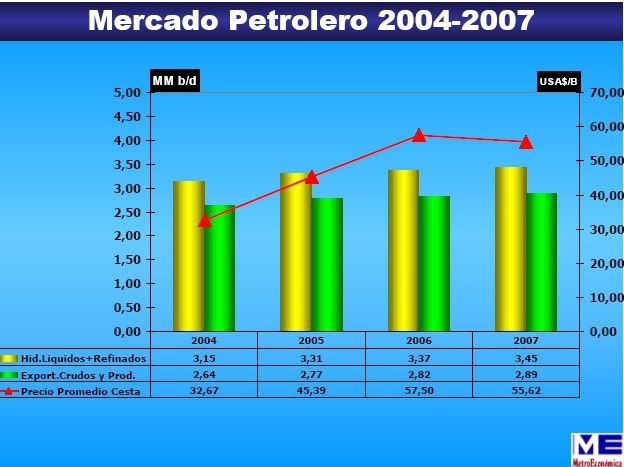
This slide is interesting. The gold bar represents Venezuelan oil production. Note how it seems to be going up, if just a little, and it also seems to be over 3 million barrels of oil per day. Yet the drumbeat of propoganda from the opposition is that oil production is well below 3 million barrels and falling.
Of course, readers of this blog already knew that Venezuela was producing over 3 million barrels of oil and the opposition was just lying. Still it is interesting to see that in spite of what they say in public in Private Power point presentations amongst themselves they do condede reality. I suppose its good to see they are not so dissaciated from reality as to believe their own propoganda.
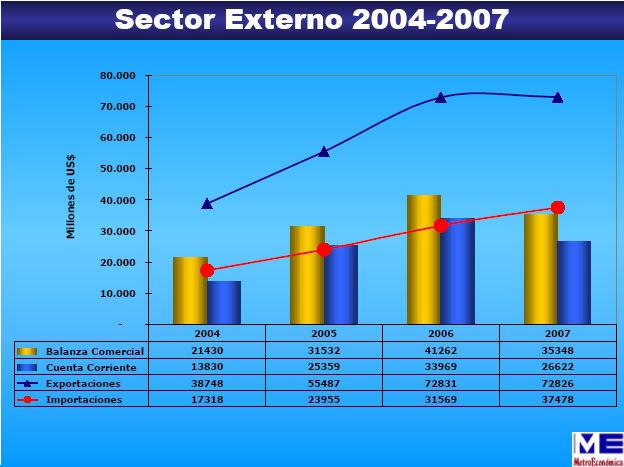
Here is a slide that shows some of the effects of those high prices with the blue line being the value of Venezuelan exports and the red line being the value of its imports. Note that Venezuela is running a huge trade surplus which is what the gold bars at the bottom represent. Americans can only drool in envy. Also note that while imports are indeed climbing (something the opposition complains about constantly in spite of a good part of it being THEM buying luxury goods) these purchases are easily afforded by Venezuela's much larger exporters. It's called living within your means - something that again would be a novel concept to most Americans.
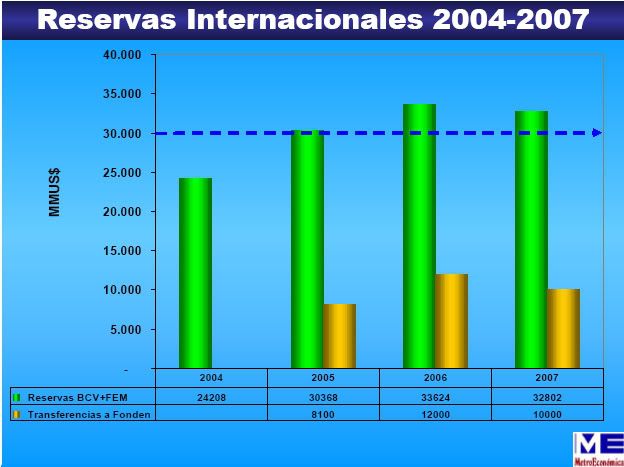
This slide is another result of the increased oil revenue. It shows the steadily increaing foriegn reserves. The last bar is a projection for 2007. Quite likely it will turn out to be an increase rather than a slight decrease MetroEconomica projects. The gold bars are the monies transferred from the reserves to the National Development Fund (Fonden) which is used for large capital projects. There are lots of those large capital projects under way in Venezuela these days and in the near future I will be showing some pictures of them (56k modem people beware!). In any event Venezuela is flush with cash as the green bars are all savings and the gold bars are to a large extent not yet spent.
To Be Continued: There are more slides which I will post when time permits...
|
But there were other ones such as a presentation on the general state of the economy by MetroEconomica

This slide which shows the REAL (ie adjusted for inflation) price of oil is quite interesting:

Note how in the decades preceding Chavez coming to office the price of oil was on a steady downward slope. Of course, it wasn't only the actions of Veneuela that were responsible for that but they played a big part. Their rampant over production and quota busting had a devastating effect on prices and despite the curve that seems to bottom out in the late 90s note that the actual price of oil headed to new lows in 1998. It was only when Chavez came to office in 1999 that it began to climb - who knows where it would have ended up if the opposition was still running the country and maximizing production. Chavez is certainly not responsible for oil's recent dizzying climb but he is responsible for getting the ball rolling in the right direction and Venezuela is reaping huge dividends.

This slide is interesting. The gold bar represents Venezuelan oil production. Note how it seems to be going up, if just a little, and it also seems to be over 3 million barrels of oil per day. Yet the drumbeat of propoganda from the opposition is that oil production is well below 3 million barrels and falling.
Of course, readers of this blog already knew that Venezuela was producing over 3 million barrels of oil and the opposition was just lying. Still it is interesting to see that in spite of what they say in public in Private Power point presentations amongst themselves they do condede reality. I suppose its good to see they are not so dissaciated from reality as to believe their own propoganda.

Here is a slide that shows some of the effects of those high prices with the blue line being the value of Venezuelan exports and the red line being the value of its imports. Note that Venezuela is running a huge trade surplus which is what the gold bars at the bottom represent. Americans can only drool in envy. Also note that while imports are indeed climbing (something the opposition complains about constantly in spite of a good part of it being THEM buying luxury goods) these purchases are easily afforded by Venezuela's much larger exporters. It's called living within your means - something that again would be a novel concept to most Americans.

This slide is another result of the increased oil revenue. It shows the steadily increaing foriegn reserves. The last bar is a projection for 2007. Quite likely it will turn out to be an increase rather than a slight decrease MetroEconomica projects. The gold bars are the monies transferred from the reserves to the National Development Fund (Fonden) which is used for large capital projects. There are lots of those large capital projects under way in Venezuela these days and in the near future I will be showing some pictures of them (56k modem people beware!). In any event Venezuela is flush with cash as the green bars are all savings and the gold bars are to a large extent not yet spent.
To Be Continued: There are more slides which I will post when time permits...
|
Wednesday, September 13, 2006
Yawn
For those of you suffering from insomnia here is the latest polling data from Venezuela:

According to this poll by opposition pollster Datanalisis those saying they would vote for Chavez has gone up from 55% in July to 58.2% in August after the opposition settled on a unified candidate.
And what did settling on a unified candidate accomplish? Simple, the people who would have previously voted for Borges or Petkoff (next to no-one) will now vote for Rosales so that he gets a whopping 17.4% support. No wonder Chavez promptly hopped on a plane and headed for an international conference in Cuba - no need to campaign, that's for sure.
Oh yeah, and the clown? He is polling at 1.4%. At this rate he'll be lucky if Venevision doesn't pull all his shows.
Finally, there are still 22.7% of Venezuelans who say they are undecided as to who they will vote for. Problem is for the opposition, even if every single one of them votes against Chavez the opposition will still get its butt kicked as badly as it did during the Recall Referendum, 58% to 42%. Yikes.
At this point the polls are all a big yawn. Unless there is some sort of dramatic shift I'm done posting on them.
|

According to this poll by opposition pollster Datanalisis those saying they would vote for Chavez has gone up from 55% in July to 58.2% in August after the opposition settled on a unified candidate.
And what did settling on a unified candidate accomplish? Simple, the people who would have previously voted for Borges or Petkoff (next to no-one) will now vote for Rosales so that he gets a whopping 17.4% support. No wonder Chavez promptly hopped on a plane and headed for an international conference in Cuba - no need to campaign, that's for sure.
Oh yeah, and the clown? He is polling at 1.4%. At this rate he'll be lucky if Venevision doesn't pull all his shows.
Finally, there are still 22.7% of Venezuelans who say they are undecided as to who they will vote for. Problem is for the opposition, even if every single one of them votes against Chavez the opposition will still get its butt kicked as badly as it did during the Recall Referendum, 58% to 42%. Yikes.
At this point the polls are all a big yawn. Unless there is some sort of dramatic shift I'm done posting on them.
|
Tuesday, September 12, 2006
Enough to make you dizzy
Talking about political parties check out this color filled graphic. This is the first draft of what the December 3rd presidential ballot in Venezuela will look like.
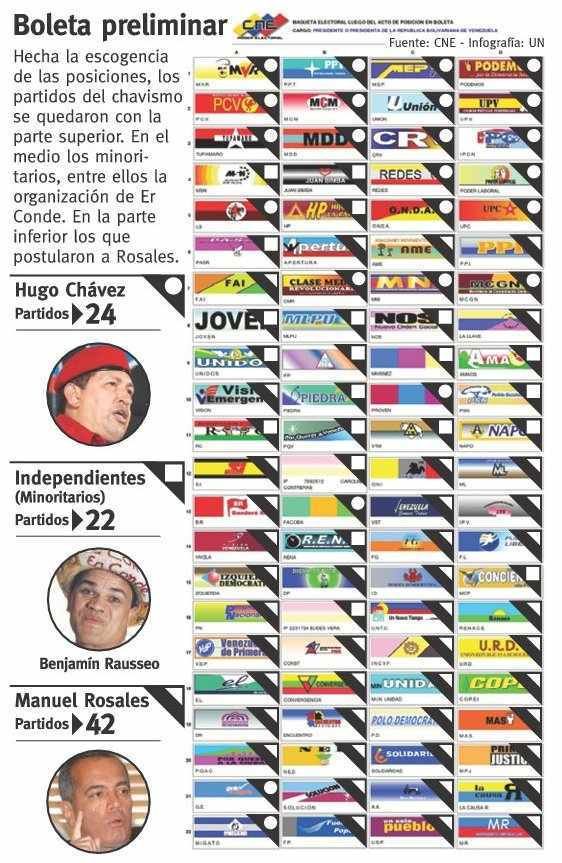
Thinking back to how Floridians were confounded by "butterfly-ballots" imagine if they walked into a voting booth and saw this thing! Looking at this I wonder if Venezuela has more political parties than bloggers.
On a more serious note I think we can rest assured the opposition will be none to happy with this. The party in the most prominent spot - the top left corner of the ballot - is none other than Chavez's MVR party. Immediately following the MVR are the junior partners of the governing coalition.
All the opposition parties are located in the middle and bottom part of the ballot.
An example of the electoral authorities favoring Chavez you think? Well, not really. According to Venezuelan electoral law the positioning of parties on the ballot is done in accordance with their vote totals in the last elections. Seeing as the MVR got the most votes in the last election they get the most valuable peice of real estate on the ballot. The opposition's stupid idea of boycotting the elections bites them in the behind yet again.
|

Thinking back to how Floridians were confounded by "butterfly-ballots" imagine if they walked into a voting booth and saw this thing! Looking at this I wonder if Venezuela has more political parties than bloggers.
On a more serious note I think we can rest assured the opposition will be none to happy with this. The party in the most prominent spot - the top left corner of the ballot - is none other than Chavez's MVR party. Immediately following the MVR are the junior partners of the governing coalition.
All the opposition parties are located in the middle and bottom part of the ballot.
An example of the electoral authorities favoring Chavez you think? Well, not really. According to Venezuelan electoral law the positioning of parties on the ballot is done in accordance with their vote totals in the last elections. Seeing as the MVR got the most votes in the last election they get the most valuable peice of real estate on the ballot. The opposition's stupid idea of boycotting the elections bites them in the behind yet again.
|
Monday, September 11, 2006
But will they hold primaries?
Much has been made of Hugo Chavez’s announcement over the weekend that all the different political parties supporting Chavez are supposed to commit hari-kari and somehow form one big happy party. Given that I have no vested interest in Chavez’s own MVR party, or his other supporting parties like the PPT, Podemos, the PCV (Venezuelan Communist Party) or the Tupamaros I am finding it difficult to care about this one way or another.
But there is one interesting aspect to this and that is it could force everyone to revisit an issue near and dear to my heart - that of internal party democracy and primaries. I’m sure most readers are aware that the six year old Venezuelan constitution very specifically states that candidates for elected office are to be chosen via internal elections (primaries) in their respective political parties. This was very deliberately included in the constitution in an effort to change the longstanding habit in Venezuela of political parties being nothing more than the appendage of a few powerful individuals who decided everything behind closed doors. I am in complete agreement with the intent of that part of the constitution.
Unfortunately it has been almost completely ignored. Save for candidates for local office by the Chavez led MVR party a couple years ago there have been essentially no internal elections to chose candidates. The pro-Chavez candidates for the National Assembly last year were picked behind closed doors by the upper echelons of the MVR (maybe even just by Chavez himself) much to my chagrin. Chavez is now running for re-election as president. And who decided that he should be the candidate? I think he did – as there weren’t any primaries the actual members of the party weren’t consulted (that he would have easily won any primary is irrelevant). His main opponent is Manuel Rosales. How was he chosen? Not many people know as it was decided behind closed doors. Not even members of his own political party, Un Nuevo Tiempo, had a say in it. This is all a pretty sad state of affairs to my mind.
During a previous election I was discussing this with an opposition supporter and pointed out to her that if the constitution were to be strictly adhered to the election should have been cancelled as none of the candidates had followed the constitutionally mandated process of being chosen through internal party elections. This person, being a good opposition sophist, retorted that the candidates didn’t actually represent parties, but rather coalitions of parties, and where therefore exempted from the primary requirement. And while I have never heard any Chavistas make similar arguments I suppose they must agree with it – how else could they explain their ignoring the constitution?
Personally I think that is an argument that only a paid sophist, i.e. a lawyer, could buy. But I suppose some could find it convincing. That is where this move to one party by the pro-Chavez forces could get interesting. If there is indeed only one political party, then people running for office are clearly candidates of only that party rather than some amorphous concept like a “coalition” and it is very clear that there must be internal party elections to chose candidates. At that point people have to put their cards on the table. Either they believe in democracy and believe in the constitution or they don’t. Their decision to hold or not hold primaries will tell us all which it is.
Again, I am neither for nor against the merging of parties to create a solid political front. But I am very much for democracy. So if this new party is run from the bottom up, great. But if it continues with the tradition of being parties being run from the top down, then there will indeed be a need for a “revolution within the revolution”.
|
But there is one interesting aspect to this and that is it could force everyone to revisit an issue near and dear to my heart - that of internal party democracy and primaries. I’m sure most readers are aware that the six year old Venezuelan constitution very specifically states that candidates for elected office are to be chosen via internal elections (primaries) in their respective political parties. This was very deliberately included in the constitution in an effort to change the longstanding habit in Venezuela of political parties being nothing more than the appendage of a few powerful individuals who decided everything behind closed doors. I am in complete agreement with the intent of that part of the constitution.
Unfortunately it has been almost completely ignored. Save for candidates for local office by the Chavez led MVR party a couple years ago there have been essentially no internal elections to chose candidates. The pro-Chavez candidates for the National Assembly last year were picked behind closed doors by the upper echelons of the MVR (maybe even just by Chavez himself) much to my chagrin. Chavez is now running for re-election as president. And who decided that he should be the candidate? I think he did – as there weren’t any primaries the actual members of the party weren’t consulted (that he would have easily won any primary is irrelevant). His main opponent is Manuel Rosales. How was he chosen? Not many people know as it was decided behind closed doors. Not even members of his own political party, Un Nuevo Tiempo, had a say in it. This is all a pretty sad state of affairs to my mind.
During a previous election I was discussing this with an opposition supporter and pointed out to her that if the constitution were to be strictly adhered to the election should have been cancelled as none of the candidates had followed the constitutionally mandated process of being chosen through internal party elections. This person, being a good opposition sophist, retorted that the candidates didn’t actually represent parties, but rather coalitions of parties, and where therefore exempted from the primary requirement. And while I have never heard any Chavistas make similar arguments I suppose they must agree with it – how else could they explain their ignoring the constitution?
Personally I think that is an argument that only a paid sophist, i.e. a lawyer, could buy. But I suppose some could find it convincing. That is where this move to one party by the pro-Chavez forces could get interesting. If there is indeed only one political party, then people running for office are clearly candidates of only that party rather than some amorphous concept like a “coalition” and it is very clear that there must be internal party elections to chose candidates. At that point people have to put their cards on the table. Either they believe in democracy and believe in the constitution or they don’t. Their decision to hold or not hold primaries will tell us all which it is.
Again, I am neither for nor against the merging of parties to create a solid political front. But I am very much for democracy. So if this new party is run from the bottom up, great. But if it continues with the tradition of being parties being run from the top down, then there will indeed be a need for a “revolution within the revolution”.
|
Leave it to Rumsfeld
Just two days ago I showed a littel bit of how the pro-war crowd has highjacked the events of September 11th do justify their war in Iraq. Of course, what I showed was just one little sign at an event that was put on by a private organization (though clearly with government backing). So people could plausibly claim I was miscronstrueing that organization's views with those of the U.S. goverment and its leadership.
Leave it to Rumsfeld to come to my rescue. In an Op-Ed article published in today's Wall Street Journal he removed any doubt that the U.S. leadership tries to use the attacks of 9/11 as justification for their continued war of conquest in Iraq. Here is the first part of what he had to say:
So there you have it - it is the same "enemy" who brought about the attacks of September 11th who the U.S. is fighting in Iraq. Funny, but just about every account I have read of the war in Iraq says 95% of the people fighting the U.S. occupation there are Iraqi's. Yet no Iraqi's, to anyones knowledge, were involved in the September 11 attacks. In fact, it turns out, the Saddam Hussien regime and Al-Qaeda didn't even get along.
Moreover, at first we were told we told the objective was to overthrow Saddam Hussien and his evil regime. That was accomplished - Hussien is in prison, his sons are dead, and the regimes top officials (at least the ones from the famous deck of playing cards) are almost all either dead or in jail. So that justification no longer works.
Then we were told we were fighting former Ba'athists hellbent on regaining power or at least fighting to the end ("dead-enders" Rumsfeld called them at the time though he doesn't use that term anymore as the only people looking like dead-enders now are him, Bush, Cheney and Rice). The problem with that rational for the war though is that it is hard to get people motivated to fight Ba'athists. Who cares about them? After all, they just want to take over Iraq, not the United States, and how many Americans are going to be willing to throw away their lives fighting over that place?
The reality is the U.S. government faces problem here. How can it convince average Americans that they should spend lots of money and spill lots of blood fighting over a country that is half a world away? The only way it can do that is to use the same methods it used before - convince people that there are lots of evil people in that country who if not suppressed there will come to the United States,attack Americans on their own soil and destroy their way of life.
Younger people may be forgiven if they think this is a unique problem and a novel solution, but it isn't. This is exactly what the U.S. has done before. Anyone remember the "dominoe theory"? The Vietnam war was fought under the exact same false pretense of "fight them there or lose our freedom here". The only difference is that then the enemy was international communism whereas now it is international terrorism. Only the names change, not the pretexts.
On the bright side, they can't keep this charade up forever. Sooner or later they will have to concede defeat and leave. And when they do, and when the U.S. still lives peacefully ever after, their lies will stand naked for everyone to see. Save for all the poor people who had the misfortune of being killed in this war before those lies could be seen for what they were.
|
Leave it to Rumsfeld to come to my rescue. In an Op-Ed article published in today's Wall Street Journal he removed any doubt that the U.S. leadership tries to use the attacks of 9/11 as justification for their continued war of conquest in Iraq. Here is the first part of what he had to say:
We remember where we were that day.
At 9:38 a.m., the entire Pentagon shook. I went outside and saw the horrific face of war in the 21st century. Those present could feel the heat of the flames and smell the burning jet fuel -- all that remained of American Airlines flight 77.
Destruction surrounded us: smoldering rubble, twisted steel, victims in agony.
Last week, President Bush greeted the families of September 11 victims in the East Room of the White House and told them about the efforts to bring to justice those who attacked our nation -- and those who supported them. He said, "The families of those murdered that day have waited patiently for justice. ... They should have to wait no longer." He announced that 14 high-level terrorists, including the man referred to as the mastermind of the attacks, have been transferred to the Department of Defense and incarcerated at Guantanamo Bay. There they will be treated humanely -- though their victims were not -- and, if and when the necessary legislation is passed by the Congress, prosecuted for their crimes, in accordance with law.
President Bush has reminded us that this enemy is still seeking new ways to attack us. He told us about captured terrorists who provided key information about planned attacks on buildings here in the U.S., and about al Qaeda's efforts to obtain biological weapons. Information the interrogators received from these terrorists has led to the capture of other terrorists, who have in turn led us to still more.
Yet, even with these victories in the war, President Bush reminded us that it is important to understand the nature of this enemy, and what it is seeking to do. The extremist movement that threatens us is not a reactionary force -- it actively looks for opportunities to acquire new and deadlier weapons, to destabilize governments, and to create discord among our allies and within our own country.
This enemy has made its immediate strategy clear in public announcements and in captured documents: to undermine the Coalition effort in Iraq, drive our forces out, and then use that nation as a base from which to destabilize the surrounding nations. [empahsis mine - ow]They seek to extend a hoped-for victory in Iraq to a broad part of the Middle East and even parts of Europe and Asia -- to restore an ancient caliphate.
Iraq is the linchpin in their effort. [emphasis mine]Osama bin Laden calls Iraq the "epicenter" of this war, and he believes that "America is prepared to wage easy wars but not prepared to fight long and bitter wars." When Gen. Abizaid, commander of Central Command, was asked what effect pulling out of Iraq would have, he said the extremists would become "emboldened, empowered, more aggressive." They will turn whatever part of Iraq they can control into a safe haven for terrorists, just as Afghanistan was before September 11. They likely will attract still more recruits, inspired by their "victory" over the West.
So there you have it - it is the same "enemy" who brought about the attacks of September 11th who the U.S. is fighting in Iraq. Funny, but just about every account I have read of the war in Iraq says 95% of the people fighting the U.S. occupation there are Iraqi's. Yet no Iraqi's, to anyones knowledge, were involved in the September 11 attacks. In fact, it turns out, the Saddam Hussien regime and Al-Qaeda didn't even get along.
Moreover, at first we were told we told the objective was to overthrow Saddam Hussien and his evil regime. That was accomplished - Hussien is in prison, his sons are dead, and the regimes top officials (at least the ones from the famous deck of playing cards) are almost all either dead or in jail. So that justification no longer works.
Then we were told we were fighting former Ba'athists hellbent on regaining power or at least fighting to the end ("dead-enders" Rumsfeld called them at the time though he doesn't use that term anymore as the only people looking like dead-enders now are him, Bush, Cheney and Rice). The problem with that rational for the war though is that it is hard to get people motivated to fight Ba'athists. Who cares about them? After all, they just want to take over Iraq, not the United States, and how many Americans are going to be willing to throw away their lives fighting over that place?
The reality is the U.S. government faces problem here. How can it convince average Americans that they should spend lots of money and spill lots of blood fighting over a country that is half a world away? The only way it can do that is to use the same methods it used before - convince people that there are lots of evil people in that country who if not suppressed there will come to the United States,attack Americans on their own soil and destroy their way of life.
Younger people may be forgiven if they think this is a unique problem and a novel solution, but it isn't. This is exactly what the U.S. has done before. Anyone remember the "dominoe theory"? The Vietnam war was fought under the exact same false pretense of "fight them there or lose our freedom here". The only difference is that then the enemy was international communism whereas now it is international terrorism. Only the names change, not the pretexts.
On the bright side, they can't keep this charade up forever. Sooner or later they will have to concede defeat and leave. And when they do, and when the U.S. still lives peacefully ever after, their lies will stand naked for everyone to see. Save for all the poor people who had the misfortune of being killed in this war before those lies could be seen for what they were.
|
